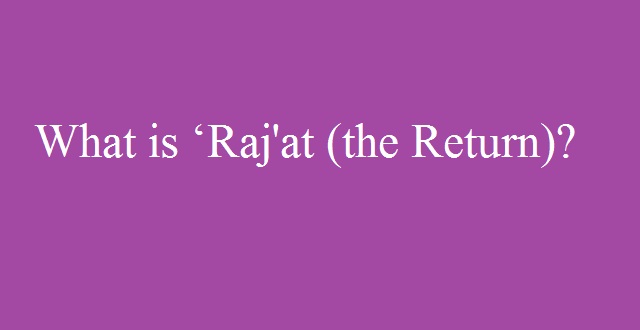Why is it that our Supplications Occasionally Remain Unanswered
Attention towards the conditions for the acceptance of prayers reveals new realities in the issue of du’a, and manifests its constructive influence. In the Islamic traditions, some of the conditions (to be taken into regard) for the purpose of acceptance of one’s prayers are as follows:
In order to have the prayers answered, first of all one should strive for the purification of the mind and soul, be repentant over (past) sins, embark upon development of the self and seek inspiration from the lives of divine leaders.
It has been reported that Imam as-Sadiq (a.s.) said: Let it never be that any of you seeks a thing from Allah (s.w.t.) except that he first praises and glorifies Him, sends salutations upon the Noble Prophet (S) and his holy progeny, confesses to his sins and exhibits repentance over them; after having done these, he should then seek his desire from Him.1
Endeavouring to have a pure life, free from usurped riches, oppression and injustice, and to refrain from acquiring one’s livelihood by illegal means.
It has been reported that the Noble Prophet (S) said:
مَنْ أَحَبَّ أَنْ يُسْتَجَابَ دُعَاؤُؤَهُ فَلْيُطَيِّبْ مَطْعَمَهُ وَ مَكْسَبَهُ.
“One who desires to have his supplications answered, should purify his food and earnings.”2
One should not desist from combating evil and inviting others towards Allah (s.w.t.).
This is because the supplications of those, who forsake ‘enjoining the good and forbidding the evil’, are not answered. The Noble Prophet (S) has said: “You must enjoin the good and forbid the evil or else Allah (s.w.t.) will cause the evil ones to prevail over the righteous ones from amongst you, and however much they may pray, (their prayers) shall not be answered!”3
In fact, abandoning this great duty of ‘national supervision’ leads to turmoil within the society as a result of which the society would be left open for the evil ones; (when this happens) supplications for the elimination of the consequences arising out of this state would be futile since this state has resulted out of man’s own deeds.
Acting in Accordance with Divine Covenants
Faith, good deeds, trustworthiness, and righteousness, (collectively) form another of the conditions for the acceptance of prayers. This is because one who is not faithful to his pledge with respect to Allah (s.w.t.), should likewise not expect Allah’s (s.w.t.) promise of answering a supplicant to be true for him too.
A person once, complaining to the Commander of the Faithful (a.s.) about his prayers not being answered, said: Despite the fact that Allah (s.w.t.) has said “Call upon Me, I will answer you”, why is it that when we supplicate to him, He does not answer our prayers?
The Imam (a.s.) replied:
إِنَّ قُلُوبَبُکُمْ خَانٍ بِثَمٌنِيَةِ خِصاَلٍ.
“Your hearts (and thoughts) have been unfaithful with respect to eight things (and this is the reason your prayers go unanswered).”
1. You have acquired the cognizance of Allah (s.w.t.) but you do not fulfill what is due to Him; consequently your cognizance of Him has not benefited your state!
2. You have brought faith upon His Messenger but (later) went on to oppose his customs; where then is the yield of your faith?
3. You have read His book but have not acted upon it; you stated: “We have heard and we obey”, but then rose up in opposition to it!
4. You say: “We fear Allah’s punishment”, but perpetually perform acts that lead you closer to it.
5. You claim to be covetous of Allah’s reward however you continue to perform acts that lead you away from it.
6. You consume Allah’s bounties but do not extend thanksgivings to Him.
7. You have been ordered to be Shaytan’s enemy (whereas you sketch plans to befriend him); you claim to be his enemy but, in practice, you do not oppose him.
8. You place into great scrutiny the faults of others but conveniently disregard your own; with such a state of affairs, how do you expect your prayers to be answered when you yourself have shut its doors? Be pious, rectify your deeds and enjoin the good and forbid the evil so that your prayers are answered.”4
This meaningful tradition explicitly states: “Allah’s promise to answer the invocations of a supplicant is not absolute, but conditional – the condition being that you should fulfill your own pledges and covenants; however the reality is that you have broken your pledge in eight ways. If you were to put an end to these, your prayers would be answered.”
Another condition for the acceptance of one’s prayers is to adjoin it with efforts and hard work. In one of the short sayings of the Commander of the Faithful (a.s.) we read:
أَلدَّاعِي بِلاَ عَمَلٍ كَالرَّامِي بِلاَ وَتَرٍ.
“A supplicant (who prays) without effort and endeavour is like an archer without a bowstring!”5
In view of the fact that the bowstring is a means to propel the arrow towards the target, the influence of ‘effort’ in the effectiveness of du’a becomes evident.
The above five conditions are illustrative of the reality that not only should du’a not become a substitute for the natural means and ordinary measures with the purpose of achieving an objective but rather, in order for it to be answered, there ought to occur a complete transformation in the life of the supplicant – his outlook ought to be overhauled and his past deeds reviewed.
In view of the above, does it not appear that characterizing du’a as being narcotic and soporific indicates either a lack of knowledge or a sinister motive?6
——————————————————————–
1. Safinatul Bihar, vol. 1, pg. 448, 449
2. Ibid.
3. Ibid.
4. Safinatul Bihar, vol. 1, pg. 448
5. Nahjul Balagha, Short Sayings 337
6. Tafsir-e-Namuna, vol. 1, pg. 643











